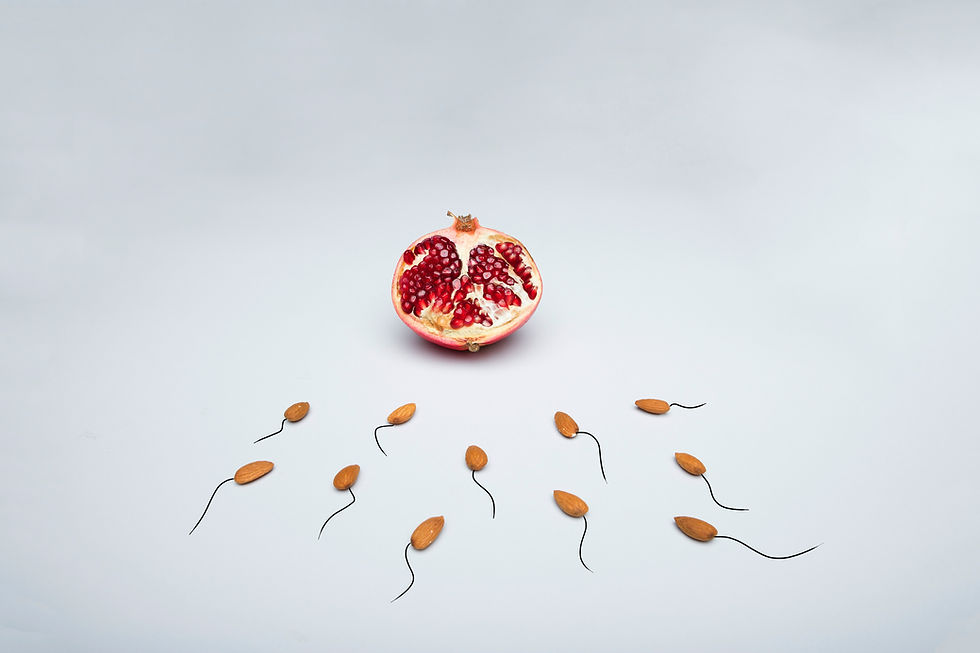Whether or not period sex is normal for you or a big no, when it comes to fertility at this time of the month we understand how confusing it might be. Thinking, "If I'm on my period then how could I get pregnant?" The truth is, it’s extremely unlikely.

What do you need to know about your cycle?
With everyone's body being different, so are their cycles.
Take for example those with 30-day cycles. If your cycle might be 30 days, starting at day 1 of bleeding that will continue for 2-5 days. This means that day 29 will be the last day of this period and the next day the bleeding begins as a new cycle begins (day 1). The ovulation will occur about 14 days before the next period starts. In this 30 day cycle meaning ovulation should happen at about day 16.
What if you have a shorter cycle?
For some women who have short cycles, let's say 21-23 days, there can be a risk of pregnancy during the period. If we were to count back the cycle using the shortest amount of days(21) then day 1 would be the first day of bleeding and day 21 the last day of the period. Bleeding could continue for 2-5 days and ovulation on day 14. Short cycles mainly happen to older women who have less risk of getting pregnant but some young and fertile women can have it.
The ovulation period
Let’s start by getting some ovulation facts out of the way.
Ovulation occurs 11-16 days before the next period starts
The fertile window opens up about 5 days before ovulation day. These are the days when sperms can survive waiting for the egg to release!
Ovulation lasts for 12-24 hours only
How about we expound on some of these facts?
The days before ovulation day are called fertile windows. This is because you don't exactly know when the ovulation will come and also as the sperms can live for about 5-6 days in the vagina, waiting for the ovulation and the egg. This means that unprotected sex about a week before ovulation can be a risk/chance of pregnancy. As it's very difficult to know what day the ovulation will occur, the advice for women wanting to avoid pregnancy will be to not have unprotected sex about 10 days before the ovulation is expected.
The ovulation and the egg will happen for about 24 hours, after that the ovulation is over.
Once it’s done, the risk of pregnancy is really small. This means that during the period, the risk/chance of pregnancy is almost zero.
What would make it possible for pregnancy to occur?
Keeping in mind all that has already been explained earlier about cycles and ovulation.
A woman with ovulation 12-16 days before a new cycle starts would have ovulation at about a week after the period started and as a result, the fertile window and the period can happen at the same time.
Can you get pregnant during your period with birth control?
No birth control method is 100% safe. S0o should you use a condom and it breaks and you happen to be fertile then there’s a risk of being pregnant but it is still unlikely. However, if using a hormonal birth control method the bleeding you experience is not, in fact, a period but referred to as withdrawal bleeding. Hormonal birth controls stop ovulation which means you can’t have a fertile window.
it's important to not misjudge bleeding caused by weekly use of emergency pills or misuse of daily pills. These blessings are not period bleeding and can also lead to an impossibility of understanding the cycle, counting ovulation days and expected periods.
In Summary
The longer the cycle the less risk/chance of pregnancy during the period
The longer the cycle the more days in from the period to the ovulation.
Irregular cycles are hard to predict ovulation although irregular cycles are rarely short cycles. More commonly longer cycles are irregular.
Stay informed, stay in control.
Is your cycle long or short? Share with us in the comments!

https://www.epsxf.com ; https://www.yyeps.com; https://epsxf.com; https://yyeps.com; https://eps-machine.net; https://epp-machine.com; https://eptu-machine.com; https://eps-machine.top; https://epp-eptu-machine.com; https://sw-eps.com; EPS Machine EPS Cutting Machine; EPP MachineEps Raw Material; EPS MachineEPS Mould; EPP MachineEPS Recycling System; EPS MachineEPS Block Molding Machine; EPP MachineEPS Shape Moulding Machine; EPP MachineAging Silo for EPS Machine; EPS Machine; ETPU MachineEPS and EPP Heating Room; ETPU Machine; ETPU MachineAging Silo for EPS Machine; EPP Machine; EPP Machine EPP Shape Moulding Machine; EPS MachineEPS and EPP Heating Room;
EPP Machine EPS Machine ETPU Machine EPS Mould EPP Machine EPS Machine ETPU Machine EPS Mould Eps Raw Material EPP Machine EPS Machine ETPU Machine EPS Mould EPP Machine EPS Machine ETPU Machine EPS Mould Eps Raw Material
I usually have 28 days cycle , but today is day 35 and I haven't seen my period, though I had unprotected sex, could it be pregnancy or what
Longer
Short